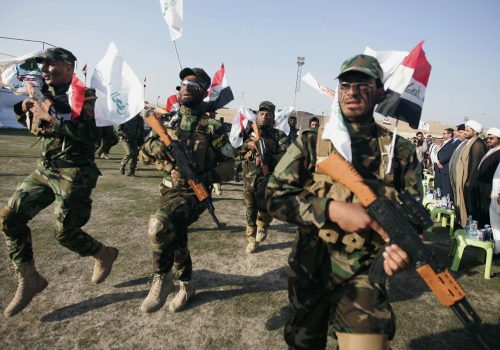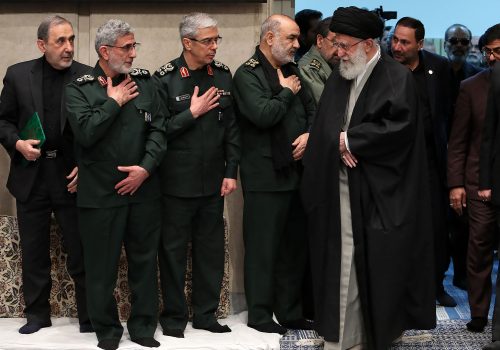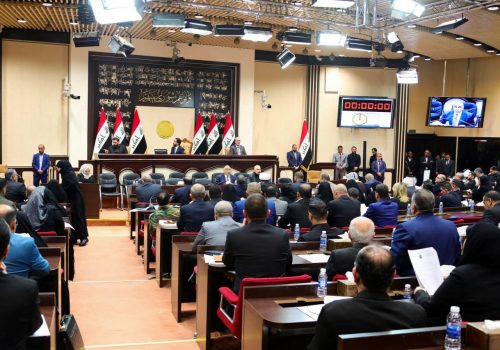How to normalize the Iraq-Iran relationship
Qasem Soleimani, the late and unlamented leader of Iran’s Quds Force, used to visit Iraq about twice a month. He would come more when he was needed: for example, when the Iraqis had to form a government and Iran ordered him to meddle. Or he would when nothing much was happening except the odd care and feeding of his proxy militias. In none of these trips did Soleimani need a visa or get his passport stamped at the airport like even the most august American, even though every American, bar none, gets a visa to Iraq.
Nothing illustrated the yawning abnormality of the Iraq-Iran relationship better than the complete immunity that Iran’s Islamic Revolutionary Guard Corps (IRGC) felt in their host country, exemplified by the small matter of Soleimani’s passport situation. But it was more than that; there is a perception among mostly—but not only—Iraqi Sunnis that Iran won the war that had been fought in fits and starts since the US invasion of Iraq in 2003. They point to the militias, codified as part of the Iraqi state since 2014, nearly half of which functionally answer to Iran. Or the electricity imported from Iran at above-market rates. Or the gas, similarly and ludicrously imported from Iran, regardless of Iraq’s own immense gas reserves. Or the deep, personal involvement of Iran in selecting personnel for senior Iraqi security appointments, including the prime minister. And there is some truth to this: all of these are marks of an abnormal relationship—worse than being dependent and sometimes as bad as being a proxy.
Since the United States reimposed sanctions on Iran in May 2018, the US has often been asked what it wanted out of Iraq. The answer was a normal relationship—not an Iraq cut off from Iran, because that was impossible. A normal relationship that made sovereign decisions about the full range of issues before it, without threat of physical coercion. In the post-Islamic State of Iraq and al-Sham and post-Donald Trump era, this goal should remain.
Of course, no country exists in a vacuum. The $12 billion per year trading relationship between Iraq and Iran, the religious and cultural ties, and the simple proximity of the shared one thousand-mile border will all serve to keep the two countries linked. But there are certain clarifications of the relationship that every Iraqi should support—and Americans should insist upon.
Iraq’s militias
A sovereign state cannot have upwards of sixty thousand armed men operating in its territory without control of the central government. This is not a new problem. Militias have existed in Iraq since 2003 and even well before that if the Kurds are counted. But the trafficking of long-range missiles from Iran to Syria is a new problem and it has the potential to destabilize Iraq and drag it into war. In retrospect, Iraq’s long-term security was clearly damaged by the 2014 and 2016 integration of Iraqi militias into the state. Grand Ayatollah Ali al-Sistani’s fatwa raising volunteers to defend Baghdad in 2014 may have saved the nation, to be clear, but the government’s codification of all of them—including the Iran-controlled ones—into the Iraqi government expanded Iranian influence and neutered the best way of countering them.
Before 2016—and especially before 2014—the best tool for pro-sovereignty Iraqis to limit the funding of these groups was to insist that they were outside the law. But continued budget increases for the Popular Mobilization Committees (PMC), the umbrella arm of the militias, combined with the immunity the Iran-backed groups enjoy in Iraq and their increasing institutional control of the state at places like the airport makes this a growing problem.
What is a realistic goal to insist on? The cessation of transnational missile trafficking should be the US objective. For Iraqis, the goal should be the subordination of the PMC to the defense ministry and the regular army. This is no immediate solution, but will facilitate greater budget controls, cross-posting of officers, cross-training of troops, and a gradual merging of the regular forces with the militias, both good and bad. Of course, some groups and figures will not go quietly and will continue their activities until they are stopped. But that point is far off.
Iraq’s energy
It is laughable that a country as large and energy rich as Iraq should be so dependent on overpriced Iranian energy and struggle to provide electricity and heating to its citizens at all. The second problem impedes solving the first. As of 2018, Iraq ran at about a 10,000 megawatt (MW) deficit year-on-year at peak demand. Because of population growth, this gap is widening. The government of Prime Minister Adil Abdel Mahdi actually did an effective job of increasing power generation by about 1,500-2,000 MW, but that still left a gap, which is met by roughly 1,200 MW from Iran—plus additional gas-powered electricity supplies of 3300 MW—conducted by four lines that connect the two grids.
Iran overcharges Iraq for this energy supply, especially its gas imports, and it is plainly in Iran’s interest to prevent Iraq from weaning itself off of its neighbor. It is impossible to tell how much of the Iraqi government’s dependence and reluctance to sign deals—particularly those related to gas—to increase self-sufficiency is bureaucratic inertia, the supply and demand of the market, and/or coercive pressure by the IRGC to keep the faucet on is. Since 2018, the Iraqis have done a good job in ensuring that electricity payments to Iran were not easily convertible into the hard currency that the IRGC needed to support its activities abroad.
Iraq should be able to make decisions on energy projects without the threat of physical or market coercion from Iran. This is an area where the interests of all Iraqis and every nation except for Iran intersects. Progress should be easy to measure. Is Iraq reducing its dependence on imported energy? In electricity, partially. The Abdel Mahdi government initiated about $15 billion worth of electricity projects to boost supply and also inked a deal to link the Iraqi grid to the Gulf Cooperation Council grid. However, Iraq barely expanded its gas capture operations. Is the total sclerosis on new energy projects a result of Iran retaining, by hook or crook, its market share? Or is it just sclerosis?
Politics and people
Iran plays a deep and violent game with Iraqi politics. It pays attention to all senior security appointments and its proxies often campaign against and threaten and force the removal of personnel that could pose a threat, such as, General Mahmoud al-Falahi in Anbar. Falahi was targeted in 2019 by militia elements that suspected him of having too close a relationship with the US and of threatening their control of the border. Falahi was removed almost overnight.
The selection of prime ministers is also subject to Iranian approval, if not diktat—or more accurately, the approval of the political blocs that represent Iran-aligned militias. Control of the Interior Ministry falls to the Badr Brigade, which is mostly dependent on Iran, and the PMC is dominated by its Iranian-backed elements which have effectively blocked institutional reform to date. When Iraqis can make personnel decisions independently, without fear of Kitab Hezbollah showing up on their doorstep, they will have a more normal political system.
The thread running through these three areas—security, energy, and politics—is non-coercive sovereignty. Of course, Iran will have influence in Iraq for the foreseeable future. But we should aspire to have it be the right kind of influence—economic and diplomatic—not anonymous masked men in the night with guns. That reflects what Americans and Iraqis both should like to see in a normal Iraq-Iran relationship.
What will not come about in Iraq is an end to militia attacks like the one in Iraqi Kurdistan on February 16. As long as the US is balancing against Iran’s influence in the Middle East, there will be a low-intensity conflict played out between the two. Only three things can stop that.
First, a Soviet-style collapse of the current Iranian regime, which abruptly cuts support to all of its proxy groups and reintegrates into the region with a new regime identity. Second, the US delegation of balancing responsibilities to regional states—allied or not—which poses numerous additional challenges including human rights concerns. And, third, a diplomatic agreement (de jure or de facto) on regional influence issues between the US and Iran.
This is something of a white whale and would require US security to be comfortable with an Iran that dominates the Persian Gulf among other challenges, which seems unlikely in the current Iranian incarnation. Until any of those outcomes changes the need for US balancing, the current low-intensity conflict will continue.
But that is all right—the US can live with that as long as it realizes the conflict exists and acts accordingly. The American response to Iran’s militia attacks of February 16 was worthwhile. It would have been more valuable had it landed in Iraq on some clear proxy target, ideally acting malign, since in Syria Iran has generally already priced in the risk to its operations, and so the deterrent value is less. More importantly, the best control over Iranian proxy attacks in Iraq is the Iraqis themselves; that the political fallout of Iranian escalation with the US hurts the strategic goals of Iranian allies in parliament. It hurts both of us, but the Iranians need action: they want a binding resolution kicking us out and we only need stasis. In this case, gridlock works for us, and if the Iranians make themselves unpopular by escalating, they will get gridlock. And more broadly the Iraqis tend to notice that Iran can act with impunity, in Iraq, if they do in fact act with impunity, and that affects their political decisions, not least of which involve the militias.
As it happened, when the new Quds Force commander Esmail Ghaani visited Iraq in June of 2020, he did need a visa. That is progress and it suggested, not for the first time, that a more normal relationship is popular in Baghdad as well as Washington.
Andrew Peek is the former Deputy Assistant Secretary of State for Iraq and Iran at the US Department of State from 2017-2019.
Image: Iraqi Popular Mobilisation Forces (Hashid Shaabi) march during the funeral of members of Shi'ite group Asaib Ahl al-Haq, who were killed when protesters attacked the group's office during anti-government protests, in Baghdad, Iraq October 26, 2019. REUTERS/Thaier Al-Sudani


